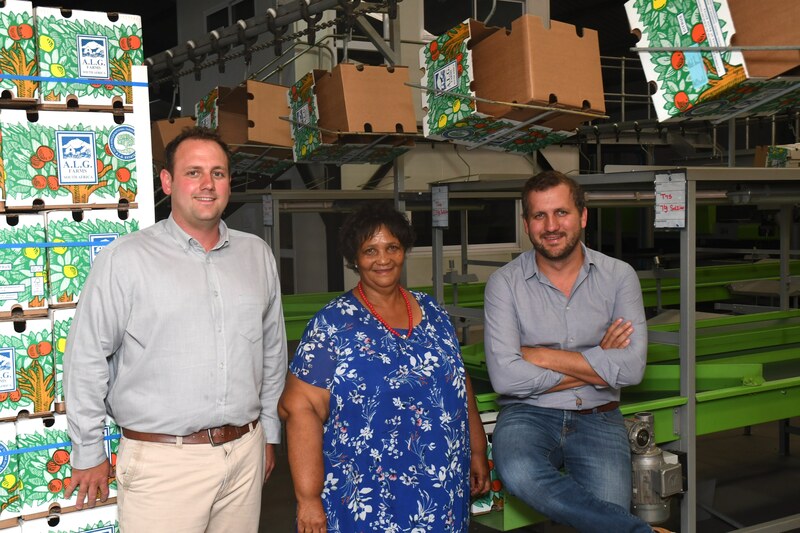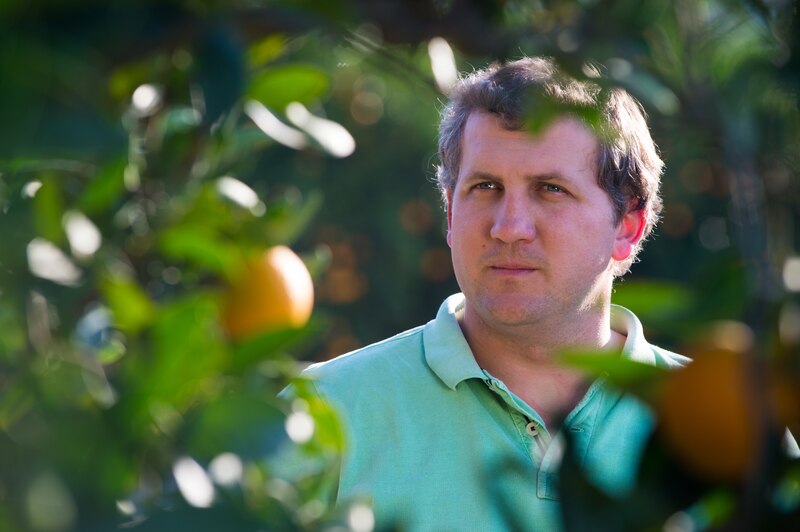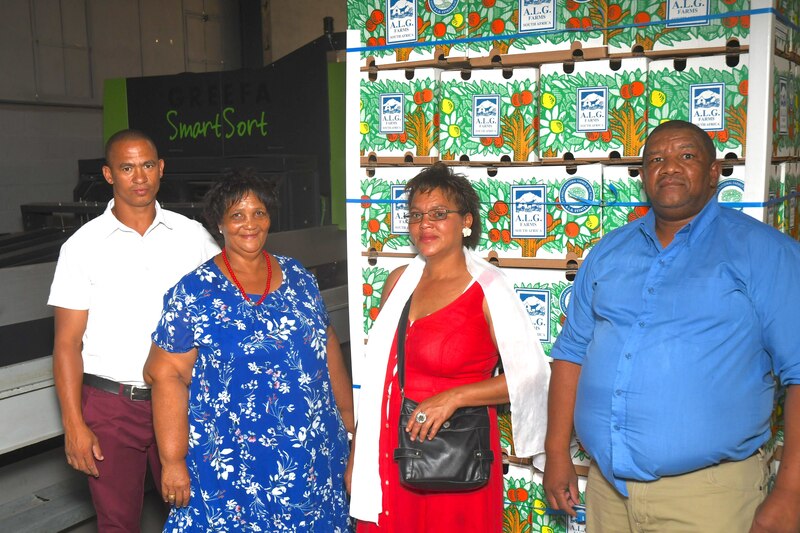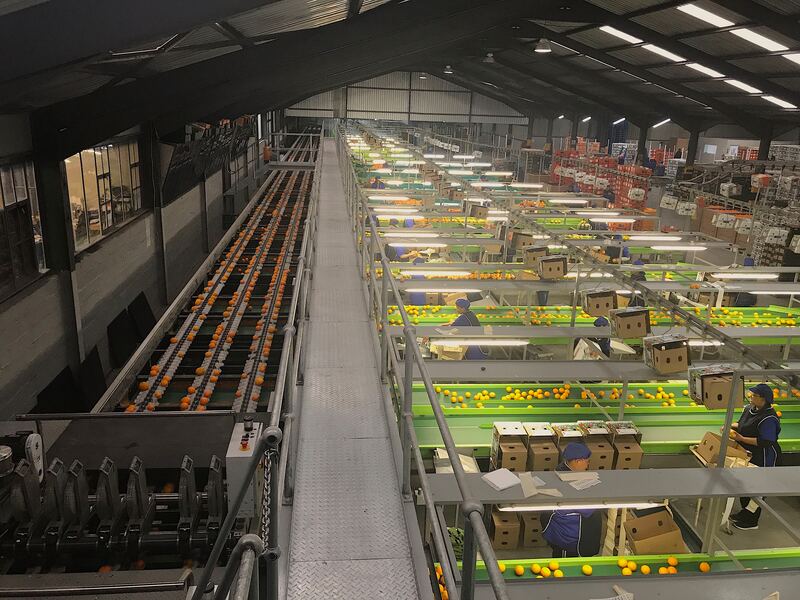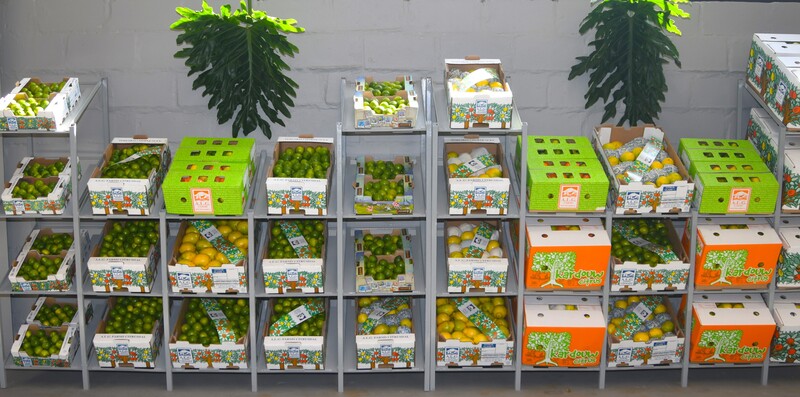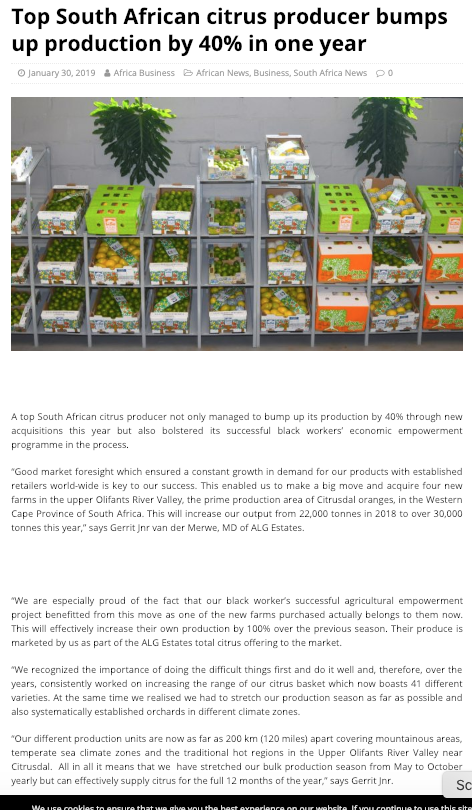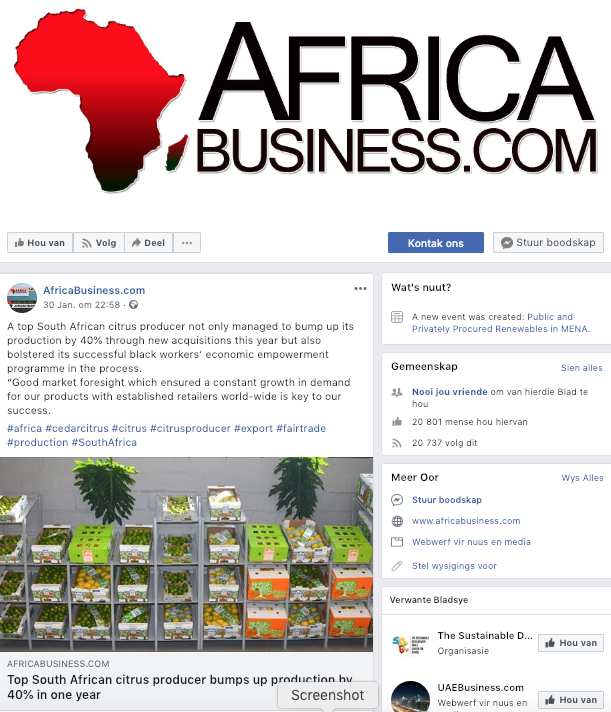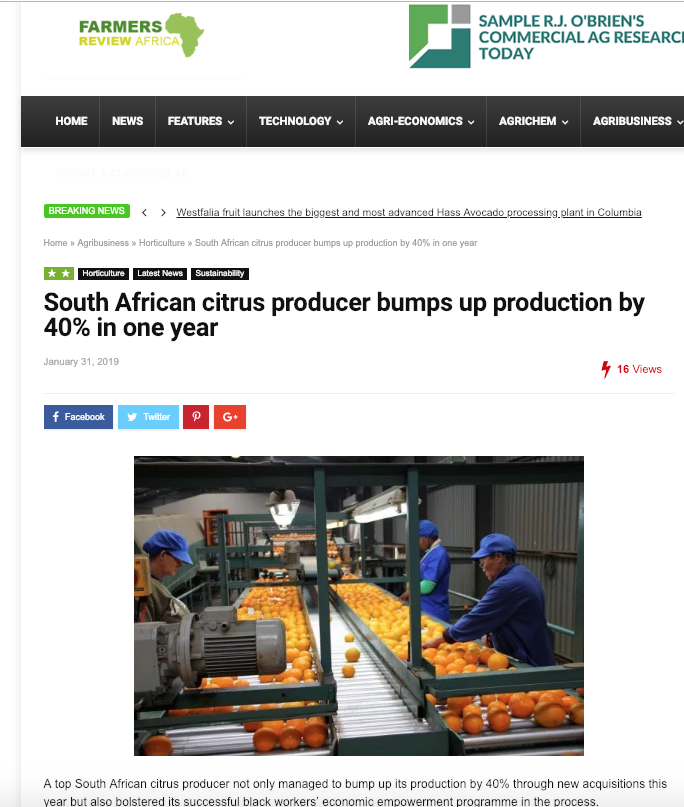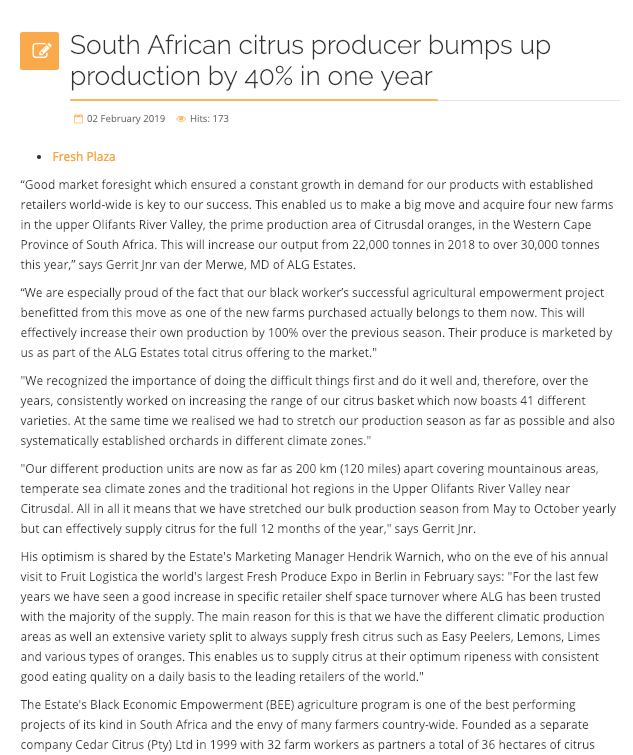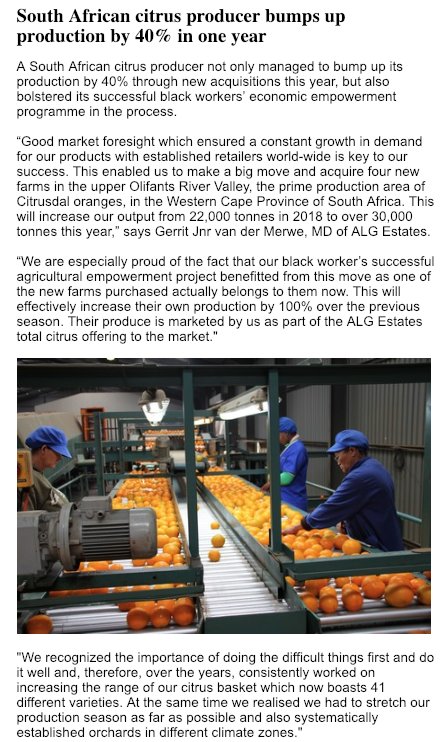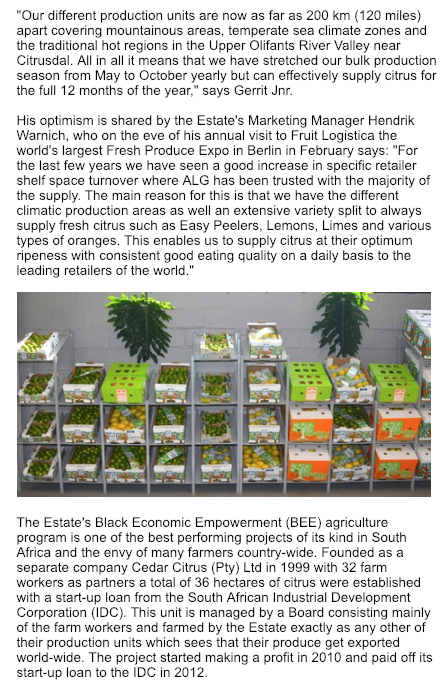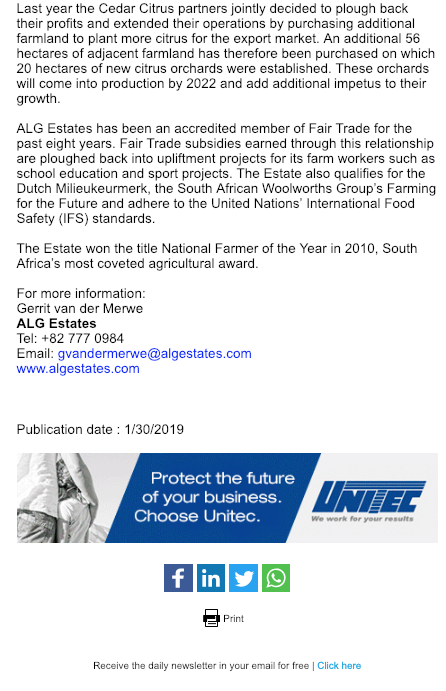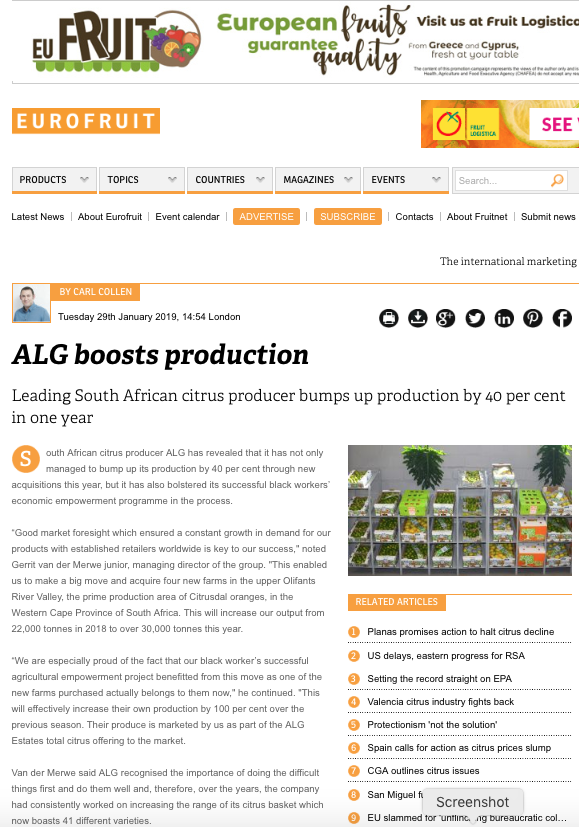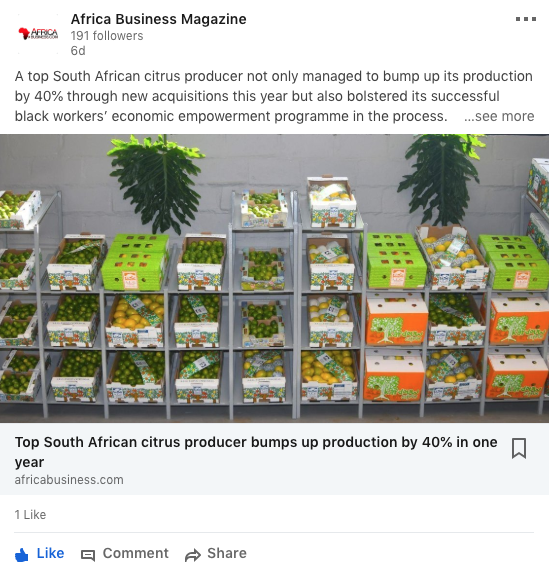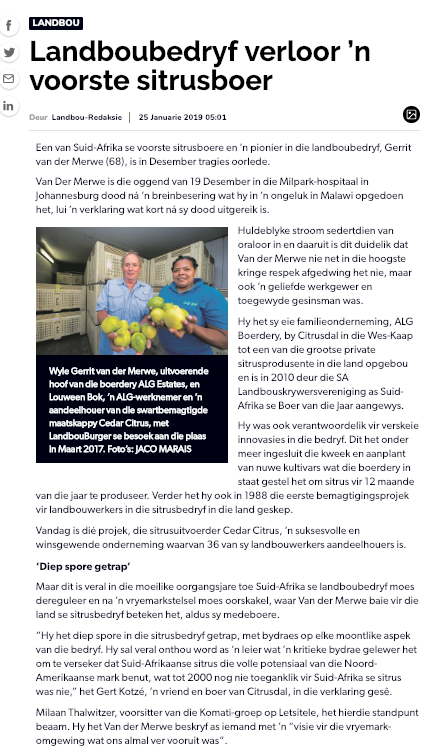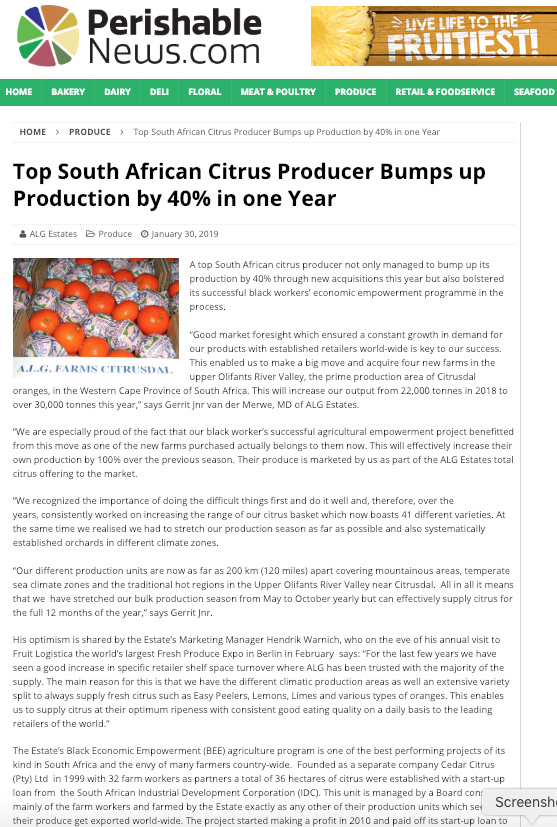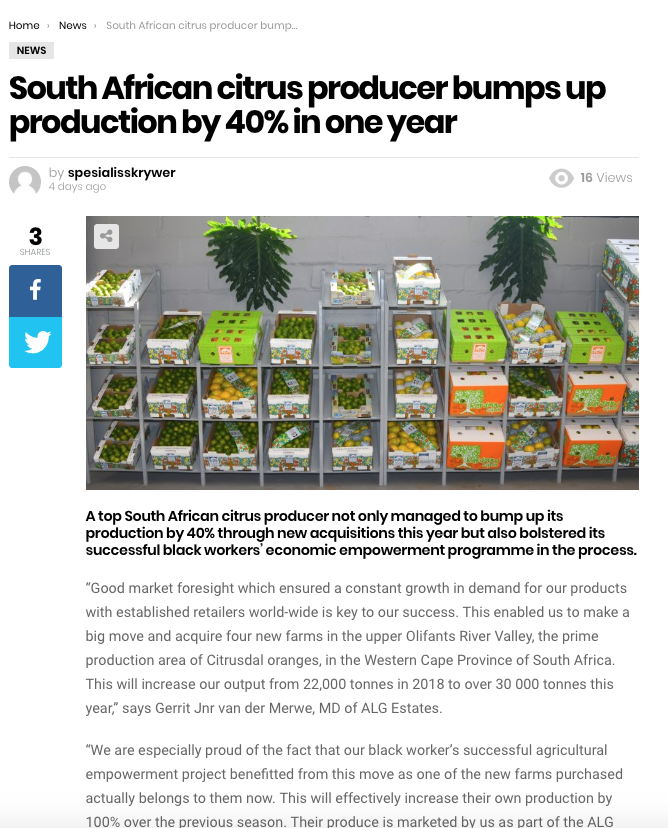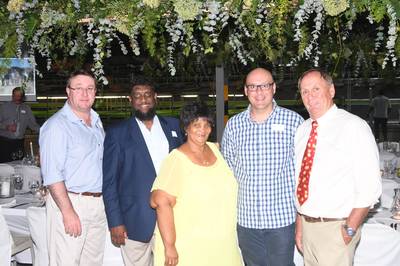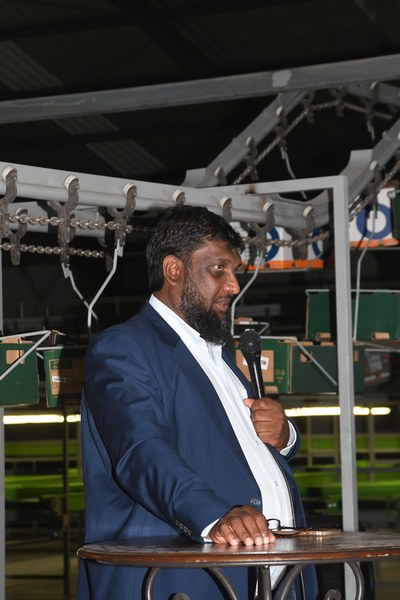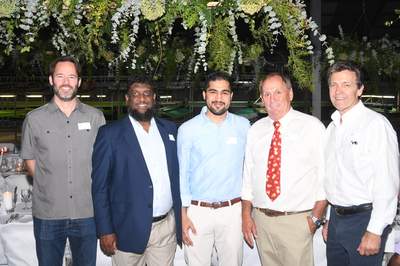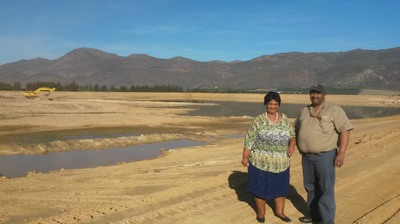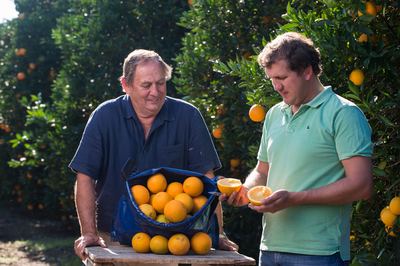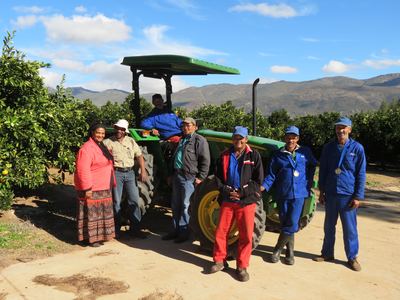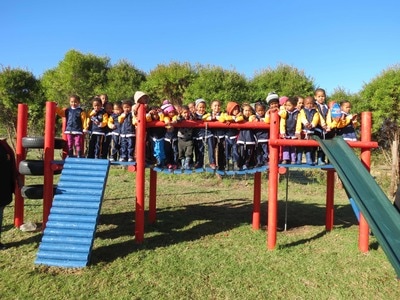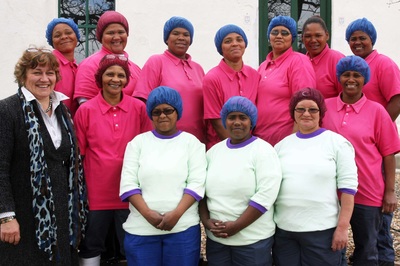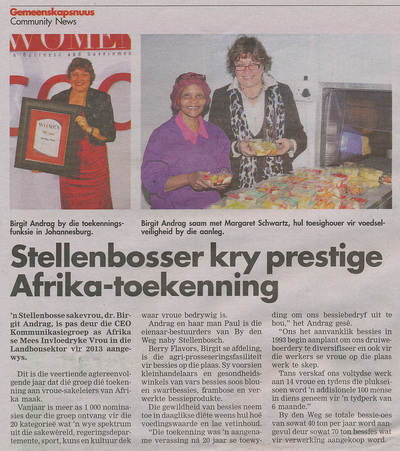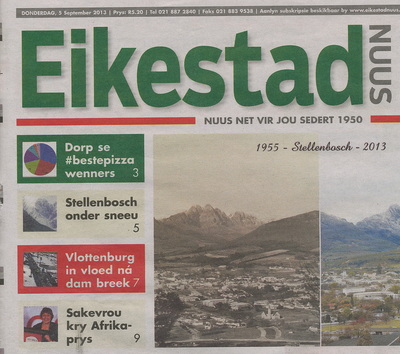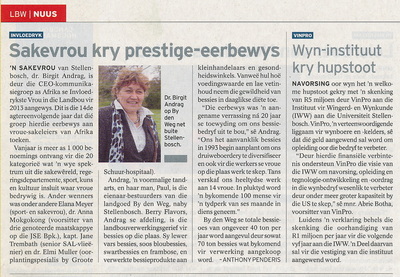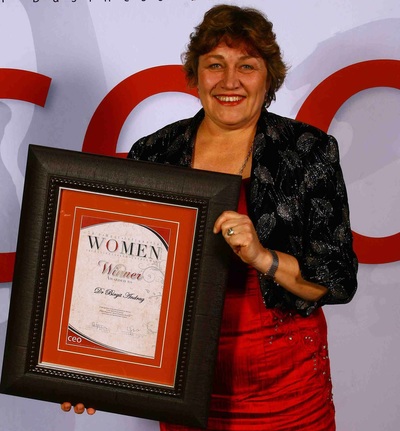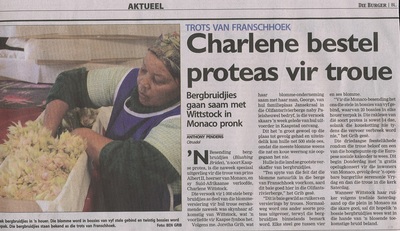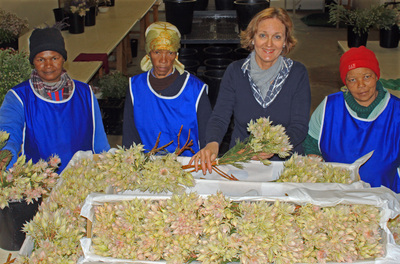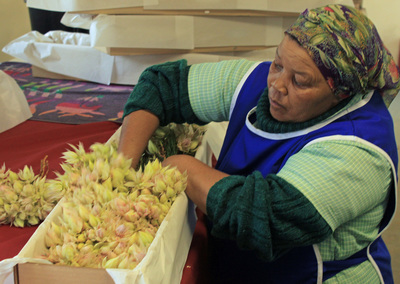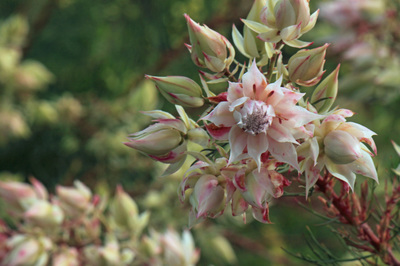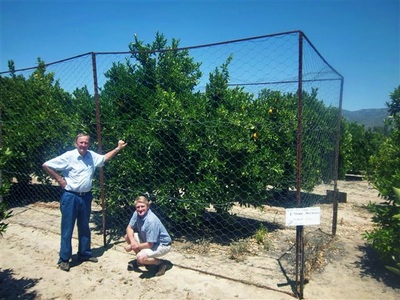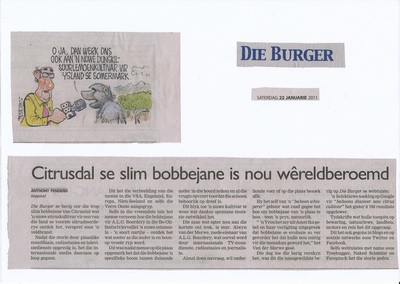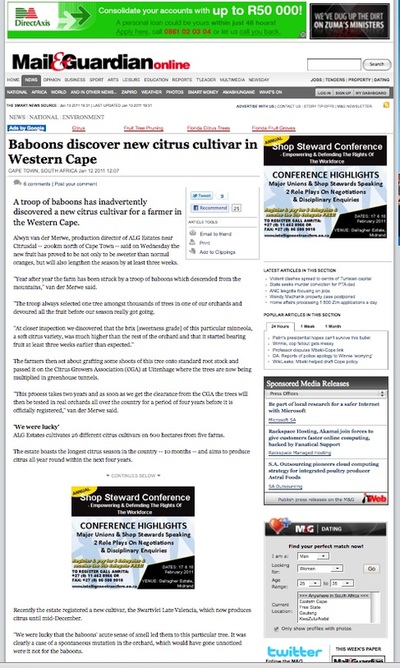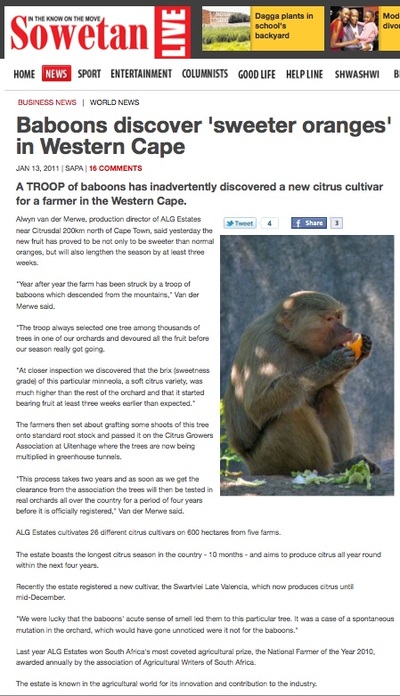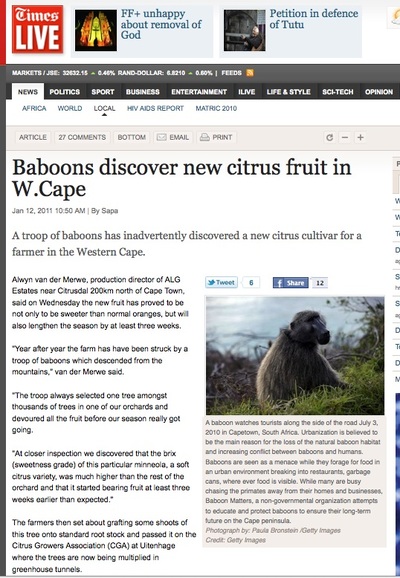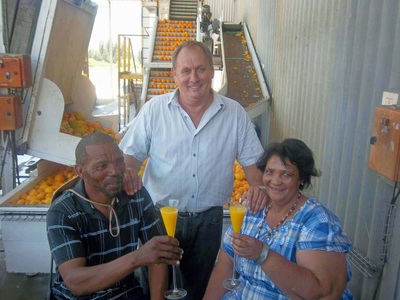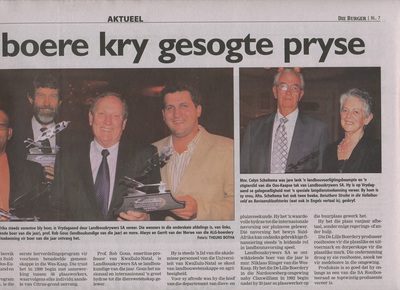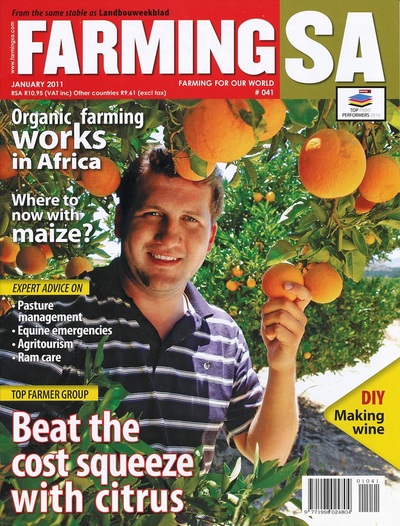Anthony Penderis Agriculture Articles
Top South African citrus producer bumps up production by 40% in one year
Media Release
30 January 2019
Top South African citrus producer bumps up production by 40% in one year
A top South African citrus producer not only managed to bump up its production by 40% through new acquisitions this year but also bolstered its successful black workers’ economic empowerment programme in the process.
“Good market foresight which ensured a constant growth in demand for our products with established retailers world-wide is key to our success. This enabled us to make a big move and acquire four new farms in the upper Olifants River Valley, the prime production area of Citrusdal oranges, in the Western Cape Province of South Africa. This will increase our output from 22,000 tonnes in 2018 to over 30,000 tonnes this year,” says Gerrit Jnr van der Merwe, MD of ALG Estates.
“We are especially proud of the fact that our black worker’s successful agricultural empowerment project benefitted from this move as one of the new farms purchased actually belongs to them now. This will effectively increase their own production by 100% over the previous season. Their produce is marketed by us as part of the ALG Estates total citrus offering to the market.
"We recognized the importance of doing the difficult things first and do it well and, therefore, over the years, consistently worked on increasing the range of our citrus basket which now boasts 41 different varieties. At the same time we realised we had to stretch our production season as far as possible and also systematically established orchards in different climate zones.
"Our different production units are now as far as 200 km (120 miles) apart covering mountainous areas, temperate sea climate zones and the traditional hot regions in the Upper Olifants River Valley near Citrusdal. All in all it means that we have stretched our bulk production season from May to October yearly but can effectively supply citrus for the full 12 months of the year," says Gerrit Jnr.
His optimism is shared by the Estate's Marketing Manager Hendrik Warnich, who on the eve of his annual visit to Fruit Logistica the world's largest Fresh Produce Expo in Berlin in February says: "For the last few years we have seen a good increase in specific retailer shelf space turnover where ALG has been trusted with the majority of the supply. The main reason for this is that we have the different climatic production areas as well an extensive variety split to always supply fresh citrus such as Easy Peelers, Lemons, Limes and various types of oranges. This enables us to supply citrus at their optimum ripeness with consistent good eating quality on a daily basis to the leading retailers of the world."
The Estate's Black Economic Empowerment (BEE) agriculture program is one of the best performing projects of its kind in South Africa and the envy of many farmers country-wide. Founded as a separate company Cedar Citrus (Pty) Ltd in 1999 with 32 farm workers as partners a total of 36 hectares of citrus were established with a start-up loan from the South African Industrial Development Corporation (IDC). This unit is managed by a Board consisting mainly of the farm workers and farmed by the Estate exactly as any other of their production units which sees that their produce get exported world-wide. The project started making a profit in 2010 and paid off its start-up loan to the IDC in 2012.
Last year the Cedar Citrus partners jointly decided to plough back their profits and extended their operations by purchasing additional farmland to plant more citrus for the export market. An additional 56 hectares of adjacent farmland has therefore been purchased on which 20 hectares of new citrus orchards were established. These orchards will come into production by 2022 and add additional impetus to their growth.
ALG Estates has been an accredited member of Fair Trade for the past eight years. Fair Trade subsidies earned through this relationship are ploughed back into upliftment projects for its farm workers such as school education and sport projects. The Estate also qualifies for the Dutch Milieukeurmerk, the South African Woolworths Group’s Farming for the Future and adhere to the United Nations’ International Food Safety (IFS) standards.
The Estate won the title National Farmer of the Year in 2010, South Africa’s most coveted agricultural award.
End
Caption: Hendrik Warnich, Lena September & Gerrit van der Merwe.jpg
ALG Estates Marketing Manager Hendrik Warnich with Lena September a Director of the Board and Gerrit Jnr. van der Merwe Managing Director of the Company. Pic: John Ross McGregor
Caption: Cedar Citrus Board.jpg
Board members of Cedar Citrus the Estate’s the black empowerment company are form left Leon Wesley Mogapi, Lena September, Jossie Catherine Frazer and Dirk Dirks. Pic: John Ross McGregor
Caption: ALG Estates Products.jpg
The ALG Estate’s citrus basket now boasts 41 different varieties which enables it to supply citrus for the full 12 months of the year. Pic: John Ross McGregor
Caption: ALG Estates New Pack House.jpg
The interior of ALG Estates new state of the art packhouse. The Estate employs 120 full time workers and up to 800 part-time workers during the peak packing season.
Caption: Gerrit van der Merwe Jnr.jpg
Gerrit van der Merwe Jnr the MD of ALG Estates
Anthony Penderis Media Services compiled this report on behalf of ALG Estates
Contact Details
Gerrit van der Merwe
+82 777 0984
[email protected]
www.algestates.com
Hendrik Warnich
+27 73 229 4687
[email protected]
www.algestates.com
Anthony Penderis
+27 84 306 0331
[email protected]
www.anthonypenderis.com
30 January 2019
Top South African citrus producer bumps up production by 40% in one year
A top South African citrus producer not only managed to bump up its production by 40% through new acquisitions this year but also bolstered its successful black workers’ economic empowerment programme in the process.
“Good market foresight which ensured a constant growth in demand for our products with established retailers world-wide is key to our success. This enabled us to make a big move and acquire four new farms in the upper Olifants River Valley, the prime production area of Citrusdal oranges, in the Western Cape Province of South Africa. This will increase our output from 22,000 tonnes in 2018 to over 30,000 tonnes this year,” says Gerrit Jnr van der Merwe, MD of ALG Estates.
“We are especially proud of the fact that our black worker’s successful agricultural empowerment project benefitted from this move as one of the new farms purchased actually belongs to them now. This will effectively increase their own production by 100% over the previous season. Their produce is marketed by us as part of the ALG Estates total citrus offering to the market.
"We recognized the importance of doing the difficult things first and do it well and, therefore, over the years, consistently worked on increasing the range of our citrus basket which now boasts 41 different varieties. At the same time we realised we had to stretch our production season as far as possible and also systematically established orchards in different climate zones.
"Our different production units are now as far as 200 km (120 miles) apart covering mountainous areas, temperate sea climate zones and the traditional hot regions in the Upper Olifants River Valley near Citrusdal. All in all it means that we have stretched our bulk production season from May to October yearly but can effectively supply citrus for the full 12 months of the year," says Gerrit Jnr.
His optimism is shared by the Estate's Marketing Manager Hendrik Warnich, who on the eve of his annual visit to Fruit Logistica the world's largest Fresh Produce Expo in Berlin in February says: "For the last few years we have seen a good increase in specific retailer shelf space turnover where ALG has been trusted with the majority of the supply. The main reason for this is that we have the different climatic production areas as well an extensive variety split to always supply fresh citrus such as Easy Peelers, Lemons, Limes and various types of oranges. This enables us to supply citrus at their optimum ripeness with consistent good eating quality on a daily basis to the leading retailers of the world."
The Estate's Black Economic Empowerment (BEE) agriculture program is one of the best performing projects of its kind in South Africa and the envy of many farmers country-wide. Founded as a separate company Cedar Citrus (Pty) Ltd in 1999 with 32 farm workers as partners a total of 36 hectares of citrus were established with a start-up loan from the South African Industrial Development Corporation (IDC). This unit is managed by a Board consisting mainly of the farm workers and farmed by the Estate exactly as any other of their production units which sees that their produce get exported world-wide. The project started making a profit in 2010 and paid off its start-up loan to the IDC in 2012.
Last year the Cedar Citrus partners jointly decided to plough back their profits and extended their operations by purchasing additional farmland to plant more citrus for the export market. An additional 56 hectares of adjacent farmland has therefore been purchased on which 20 hectares of new citrus orchards were established. These orchards will come into production by 2022 and add additional impetus to their growth.
ALG Estates has been an accredited member of Fair Trade for the past eight years. Fair Trade subsidies earned through this relationship are ploughed back into upliftment projects for its farm workers such as school education and sport projects. The Estate also qualifies for the Dutch Milieukeurmerk, the South African Woolworths Group’s Farming for the Future and adhere to the United Nations’ International Food Safety (IFS) standards.
The Estate won the title National Farmer of the Year in 2010, South Africa’s most coveted agricultural award.
End
Caption: Hendrik Warnich, Lena September & Gerrit van der Merwe.jpg
ALG Estates Marketing Manager Hendrik Warnich with Lena September a Director of the Board and Gerrit Jnr. van der Merwe Managing Director of the Company. Pic: John Ross McGregor
Caption: Cedar Citrus Board.jpg
Board members of Cedar Citrus the Estate’s the black empowerment company are form left Leon Wesley Mogapi, Lena September, Jossie Catherine Frazer and Dirk Dirks. Pic: John Ross McGregor
Caption: ALG Estates Products.jpg
The ALG Estate’s citrus basket now boasts 41 different varieties which enables it to supply citrus for the full 12 months of the year. Pic: John Ross McGregor
Caption: ALG Estates New Pack House.jpg
The interior of ALG Estates new state of the art packhouse. The Estate employs 120 full time workers and up to 800 part-time workers during the peak packing season.
Caption: Gerrit van der Merwe Jnr.jpg
Gerrit van der Merwe Jnr the MD of ALG Estates
Anthony Penderis Media Services compiled this report on behalf of ALG Estates
Contact Details
Gerrit van der Merwe
+82 777 0984
[email protected]
www.algestates.com
Hendrik Warnich
+27 73 229 4687
[email protected]
www.algestates.com
Anthony Penderis
+27 84 306 0331
[email protected]
www.anthonypenderis.com
South African agriculture faces many challenges
Media Release: 24 March 2017
Africa is a continent with abundant natural resources and huge market potential but the agriculture sector is in dire need of better management should we want to leave South Africa a better place for our children.
This was the crux of the message delivered last night by noted agricultural economist Prof Mohammed Karaan at a gala event of one South Africa’s leading citrus estates. In the same vein Prof Karaan pointed out that the South African government’s effort to redistribute agricultural land has not achieved the desired results and their strategy should be revised.
Prof Karaan was the guest speaker at the ALG Estates gala event in the upper Olifants River Valley near Citrusdal. The Estate celebrated their more than 250 years of business in farming with the inauguration of brand new state of the art pack house facilities. He commended the farming operation not only for their investment in their new equipment but also in their people.
ALG Estates manages one of the country’s most successful Black Economic Empowerment (BEE) agriculture programs which is making a profit and expanding. For the past seven years the Estate also passed stringent the annual auditing by Fair Trade an organization which promotes fair labor practices worldwide.
“We decided to stay in the country and re-invest in our business despite the turmoil and uncertainties we experience in South African agriculture today,” says Gerrit van der Merwe, CEO of ALG Estates a family-run business whose ancestors already settled in 1750 in the valley.
“By investing in our people through various social upliftment programs we try to be part of the solution for the country’s future. We have a very good relationship with our workers. Many of them have been with us for generations,” says Van der Merwe.
The estates founded their BEE project Cedar Citrus (PTY) Ltd in 1999 as a joint venture with 32 farm workers. It started making a profit in 2010. During 2015 this BEE company exported 1500 tons of citrus from their production unit of 36 hectares realizing a total turnover of R12 million for the year. It has now paid off its startup loan to the Industrial Development Council and expanding its operations with the purchase of additional land using their own funds.
The Estate also operates three crèches and a pre-primary school for its farm workers where some 90 children receive proper tuition as well as three meals a day. It also built several sport facilities and assists workers in their sport programs throughout the year with traveling and equipment costs partly paid by Fair Trade subsidies. The Estate in addition also supports 42 children of farm employees with school bursaries to attend schools in the district.
ALG Estates is one of South Africa’s top citrus producers which commands a leading edge on many fronts. It has 41 different citrus cultivars under production which enables the estate to produce citrus 12 months of the year.
The Estate won the title National Farmer of the Year in 2010, South Africa’s most coveted agricultural award.
end
Captions
ALG Estates Prof M Karaan
Prof Mohammed Karaan delivering his address
Alg Group Pic One\
Some guests who attend the ALG Estate’s 250 Years and Beyond Gala Event were from left Sean Walsh (CEO Cape Agri), Prof Mohammed Karaan (Agricultural Economist), Tiekie September (Director Cedar Citrus), David Cuff (Head Buyer Fresh Produce: Woolworths South Africa) and Gerrit van der Merwe (CEO ALG Estates).
ALG Group Pic Two
Some guests who attend the ALG Estate’s 250 Years and Beyond Gala Event were from left Jerry Joye (Vice-President Wonderful Fruit Packing LLC USA), Prof Mohammed Karaan (Agricultural Economist), Ebrahim Al Qatari (Business Development Manager Al Qatari Fruits Company), Gerrit van der Merwe (CEO ALG Estates) and Mark Hanks Senior Director DNE World Fruit Sales.
ALG Estates School Group
The Estate also operates three crèches and a pre-primary school for its farm workers where some 90 children receive proper tuition as well as three meals a day. Teachers at one of the crèches are from the left at back Elsie Skippers and Tersia Januarie with company directors Gerrit van der Merwe Jr, Tiekie September and Dirk Dirks.
Anthony Penderis on behalf of ALG Estates compiled this report.
Enquiries: Gerrit van der Merwe: 0825698787; [email protected] | Anthony Penderis: 0843060331; [email protected]
Africa is a continent with abundant natural resources and huge market potential but the agriculture sector is in dire need of better management should we want to leave South Africa a better place for our children.
This was the crux of the message delivered last night by noted agricultural economist Prof Mohammed Karaan at a gala event of one South Africa’s leading citrus estates. In the same vein Prof Karaan pointed out that the South African government’s effort to redistribute agricultural land has not achieved the desired results and their strategy should be revised.
Prof Karaan was the guest speaker at the ALG Estates gala event in the upper Olifants River Valley near Citrusdal. The Estate celebrated their more than 250 years of business in farming with the inauguration of brand new state of the art pack house facilities. He commended the farming operation not only for their investment in their new equipment but also in their people.
ALG Estates manages one of the country’s most successful Black Economic Empowerment (BEE) agriculture programs which is making a profit and expanding. For the past seven years the Estate also passed stringent the annual auditing by Fair Trade an organization which promotes fair labor practices worldwide.
“We decided to stay in the country and re-invest in our business despite the turmoil and uncertainties we experience in South African agriculture today,” says Gerrit van der Merwe, CEO of ALG Estates a family-run business whose ancestors already settled in 1750 in the valley.
“By investing in our people through various social upliftment programs we try to be part of the solution for the country’s future. We have a very good relationship with our workers. Many of them have been with us for generations,” says Van der Merwe.
The estates founded their BEE project Cedar Citrus (PTY) Ltd in 1999 as a joint venture with 32 farm workers. It started making a profit in 2010. During 2015 this BEE company exported 1500 tons of citrus from their production unit of 36 hectares realizing a total turnover of R12 million for the year. It has now paid off its startup loan to the Industrial Development Council and expanding its operations with the purchase of additional land using their own funds.
The Estate also operates three crèches and a pre-primary school for its farm workers where some 90 children receive proper tuition as well as three meals a day. It also built several sport facilities and assists workers in their sport programs throughout the year with traveling and equipment costs partly paid by Fair Trade subsidies. The Estate in addition also supports 42 children of farm employees with school bursaries to attend schools in the district.
ALG Estates is one of South Africa’s top citrus producers which commands a leading edge on many fronts. It has 41 different citrus cultivars under production which enables the estate to produce citrus 12 months of the year.
The Estate won the title National Farmer of the Year in 2010, South Africa’s most coveted agricultural award.
end
Captions
ALG Estates Prof M Karaan
Prof Mohammed Karaan delivering his address
Alg Group Pic One\
Some guests who attend the ALG Estate’s 250 Years and Beyond Gala Event were from left Sean Walsh (CEO Cape Agri), Prof Mohammed Karaan (Agricultural Economist), Tiekie September (Director Cedar Citrus), David Cuff (Head Buyer Fresh Produce: Woolworths South Africa) and Gerrit van der Merwe (CEO ALG Estates).
ALG Group Pic Two
Some guests who attend the ALG Estate’s 250 Years and Beyond Gala Event were from left Jerry Joye (Vice-President Wonderful Fruit Packing LLC USA), Prof Mohammed Karaan (Agricultural Economist), Ebrahim Al Qatari (Business Development Manager Al Qatari Fruits Company), Gerrit van der Merwe (CEO ALG Estates) and Mark Hanks Senior Director DNE World Fruit Sales.
ALG Estates School Group
The Estate also operates three crèches and a pre-primary school for its farm workers where some 90 children receive proper tuition as well as three meals a day. Teachers at one of the crèches are from the left at back Elsie Skippers and Tersia Januarie with company directors Gerrit van der Merwe Jr, Tiekie September and Dirk Dirks.
Anthony Penderis on behalf of ALG Estates compiled this report.
Enquiries: Gerrit van der Merwe: 0825698787; [email protected] | Anthony Penderis: 0843060331; [email protected]
South African Black Economic Empowerment agricultural project succeeds
Media Release: 1 February 2017
The failure rate of Black Economic Empowerment (BEE) projects in the South African agricultural sector is alarmingly high but a citrus project in the Upper Olifants River Valley near Citrusdal in the Western Cape has proved to be an exception.
Cedar Citrus (Pty) Ltd a BEE citrus export company established in 1999 started making a profit in 2010, paid of its startup loan to the Industrial Development Council in 2012 and is now expanding its operations with the purchase of additional farm land. During 2015 the company exported 1500 tons of citrus from their production unit of 36 hectares realizing a total turnover of R12 million for the year.
Cedar Citrus is a joint venture between 32 farm workers and ALG Estates their employer, with each party owning 50% of the company. In their next move towards more financial independence the workers jointly decided to plough back their profits and extended their operations by purchasing additional farmland to plant more citrus for the export market. An additional 92 hectares of adjacent farmland has therefore been purchased on which new citrus orchards will be established.
This of course was only made possible being part of a bigger organization such as ALG Estates their employer who is an established citrus exporter. “Constant mentorship combined with in-house training and being part of an established value-adding export chain are the necessary ingredients for success in an operation such as this,” says Gerrit van der Merwe, CEO of ALG Estates a family operation of 6 farms producing some 18,000 tons of citrus a year mostly for the export market.
“Cedar Citrus is managed as one of our production units that receives continual expert external advise from professional entomologists and horticulturalists that specialize in citrus management. This is essential for pest and disease control as well as general orchard health. We also handle all their admin such as HR, financial administration and record keeping. External chartered accountants audit the company annually.
“All 32 shareholders are furthermore employed in our various operations such as production, processing, packaging, marketing and general administration. Three of the shareholders occupy middle management positions while two are directors with executive powers. This ensures that they grow with our own operation and establish their own independence.
“Over the last few years the Cedar Citrus patch of 36 hectares coincidentally turned out to be the most lucrative of all the production units on our six farms. They produce mostly popular soft citrus varieties such as Morr and Orr as well as navels, which are exported to North America, Europe and sold locally to the Woolworths supermarket chain. We are especially pleased that the 32 shareholders of Cedar Citrus jointly decided to waive their profit payouts from the company and rather re-invest it in the expansion of their own operation,” says Van der Merwe.
The first phase of the company’s extension on the newly acquired land will be to plant 20 hectares of new popular varieties for the export market. This necessitates infrastructure such as a farm shed, farm manager housing on site, electricity, drainage, water supply and a pump house to irrigate the new orchards. It takes five years for a newly established citrus orchard to get into full production and ten years to make a profit on the initial capital outlay. The Western Cape government awarded Cedar Citrus’ good performance over the years with inter alia a sprayer, 4 crate wagons, a trailer and recently a brand new John Deer tractor.
“Cedar Citrus is one of the best performing projects of its kind in South Africa and the envy of many farmers country-wide. Not only is the project a financial success, richly compensating the beneficiaries, but a very good example of how BEE schemes should be implemented and managed in South Africa. Congratulations to Gerrit and his team at ALG Estates on this beautiful project,” says Charl Senekal, the country’s largest private sugar producer and chairman of Pro-Agri Forum the exclusive club of former South African winners of the Farmer of the Year Award.
Ends
Captions
ALG Estates BEE Directors
Cedar Citrus directors Lena September and Dirk Dirks at a dam under construction which will supply irrigation water to their new 20 hectares citrus block.
ALG Estates New Tractor
The Western Cape government awarded Cedar Citrus’ good performance over the years with inter alia a sprayer, 4 crate wagons, a trailer and recently this brand new John Deer tractor.
ALG Estates Pack House
ALG Estates manages their whole citrus supply line from the orchard to the retailer. This provides work for 120 full-time employers and a further 800 seasonal workers for 8 months of the year.
ALG Estates Nursery School
This nursery school plus three other crèches exclusively for farm workers are part of ALG Estate’s social care and education programs.
ALG Estates Father & Son
Gerrit van der Merwe and his son Gerrit Junior who is in the process of taking over the reigns of this family-run operation going back some 250 years. The estate is the second biggest citrus producer and exporter in the Western Cape region of South Africa.
Anthony Penderis on behalf of ALG Estates produced this report.
Enquiries: Gerrit van der Merwe: 082 569 8787; [email protected] | Anthony Penderis: 084 306 331; [email protected]
The failure rate of Black Economic Empowerment (BEE) projects in the South African agricultural sector is alarmingly high but a citrus project in the Upper Olifants River Valley near Citrusdal in the Western Cape has proved to be an exception.
Cedar Citrus (Pty) Ltd a BEE citrus export company established in 1999 started making a profit in 2010, paid of its startup loan to the Industrial Development Council in 2012 and is now expanding its operations with the purchase of additional farm land. During 2015 the company exported 1500 tons of citrus from their production unit of 36 hectares realizing a total turnover of R12 million for the year.
Cedar Citrus is a joint venture between 32 farm workers and ALG Estates their employer, with each party owning 50% of the company. In their next move towards more financial independence the workers jointly decided to plough back their profits and extended their operations by purchasing additional farmland to plant more citrus for the export market. An additional 92 hectares of adjacent farmland has therefore been purchased on which new citrus orchards will be established.
This of course was only made possible being part of a bigger organization such as ALG Estates their employer who is an established citrus exporter. “Constant mentorship combined with in-house training and being part of an established value-adding export chain are the necessary ingredients for success in an operation such as this,” says Gerrit van der Merwe, CEO of ALG Estates a family operation of 6 farms producing some 18,000 tons of citrus a year mostly for the export market.
“Cedar Citrus is managed as one of our production units that receives continual expert external advise from professional entomologists and horticulturalists that specialize in citrus management. This is essential for pest and disease control as well as general orchard health. We also handle all their admin such as HR, financial administration and record keeping. External chartered accountants audit the company annually.
“All 32 shareholders are furthermore employed in our various operations such as production, processing, packaging, marketing and general administration. Three of the shareholders occupy middle management positions while two are directors with executive powers. This ensures that they grow with our own operation and establish their own independence.
“Over the last few years the Cedar Citrus patch of 36 hectares coincidentally turned out to be the most lucrative of all the production units on our six farms. They produce mostly popular soft citrus varieties such as Morr and Orr as well as navels, which are exported to North America, Europe and sold locally to the Woolworths supermarket chain. We are especially pleased that the 32 shareholders of Cedar Citrus jointly decided to waive their profit payouts from the company and rather re-invest it in the expansion of their own operation,” says Van der Merwe.
The first phase of the company’s extension on the newly acquired land will be to plant 20 hectares of new popular varieties for the export market. This necessitates infrastructure such as a farm shed, farm manager housing on site, electricity, drainage, water supply and a pump house to irrigate the new orchards. It takes five years for a newly established citrus orchard to get into full production and ten years to make a profit on the initial capital outlay. The Western Cape government awarded Cedar Citrus’ good performance over the years with inter alia a sprayer, 4 crate wagons, a trailer and recently a brand new John Deer tractor.
“Cedar Citrus is one of the best performing projects of its kind in South Africa and the envy of many farmers country-wide. Not only is the project a financial success, richly compensating the beneficiaries, but a very good example of how BEE schemes should be implemented and managed in South Africa. Congratulations to Gerrit and his team at ALG Estates on this beautiful project,” says Charl Senekal, the country’s largest private sugar producer and chairman of Pro-Agri Forum the exclusive club of former South African winners of the Farmer of the Year Award.
Ends
Captions
ALG Estates BEE Directors
Cedar Citrus directors Lena September and Dirk Dirks at a dam under construction which will supply irrigation water to their new 20 hectares citrus block.
ALG Estates New Tractor
The Western Cape government awarded Cedar Citrus’ good performance over the years with inter alia a sprayer, 4 crate wagons, a trailer and recently this brand new John Deer tractor.
ALG Estates Pack House
ALG Estates manages their whole citrus supply line from the orchard to the retailer. This provides work for 120 full-time employers and a further 800 seasonal workers for 8 months of the year.
ALG Estates Nursery School
This nursery school plus three other crèches exclusively for farm workers are part of ALG Estate’s social care and education programs.
ALG Estates Father & Son
Gerrit van der Merwe and his son Gerrit Junior who is in the process of taking over the reigns of this family-run operation going back some 250 years. The estate is the second biggest citrus producer and exporter in the Western Cape region of South Africa.
Anthony Penderis on behalf of ALG Estates produced this report.
Enquiries: Gerrit van der Merwe: 082 569 8787; [email protected] | Anthony Penderis: 084 306 331; [email protected]
Stellenbosch Agriculture Businesswoman gets Prestigious Award
Press Release: 25 September 2013
The CEO Communications Group has chosen a Stellenbosch businesswoman Dr. Birgit Andrag as their 2013 Agricultural Sector winner of Africa's Most Influential Women in Business and Government .
This exceptional award now in its fourteenth year of existence comes after more than 1000 nominations were received for the 19 categories across the business, government, sport, arts, and culture spectrum. The CEO Group’s astringent 3-tier judging process firstly recognizes the individual’s capacity and career achievements in their role as executive within their sector, and secondly celebrates organizations that are committed to gender equality.
Dr. Andrag received her award at the gala dinner last month at the Gallagher Convention Centre in Johannesburg where H.E. Dr Nkosazana Dlamini-Zuma (Chairperson of the African Union) and Commander Tsietsi Mokhele (CEO of SAMSA) were guest speakers with TV personality Derek Watts as the host. Sector winners included Dr Anna Mokgokong, Chair of three JSE-listed companies in Resources and Technology, Captain Jane Trembath, most senior pilot of SAA, Dr. Elmi Muller, transplant specialist at Grootte Schuur Hospital, and Elana Meyer, well-know sport and business personality.
Birgit owns and runs a berry packing and agro-processing facility on the farm By den Weg in the Vlottenburg area near Stellenbosch. She supplies retailers and health shops with fresh or processed blueberries, blackberries, and raspberries. Berries are popular amongst health fundies mainly for their nutritional value and zero fat content. The By den Weg berry products are utilized in smoothies, ice cream toppings, yoghurt, bakery goods, jams, and cocktail concentrates.
“I am quite surprised but delighted by this honor which reflects our 20 years of hard work and dedication to the berry industry," says Dr. Andrag, a former dentist who runs her business side-by-side with her husband Paul's wine and berry growing farm. "We started the berry operation in 1993 to diversify from our wine business but also to establish full-time employment for our women on the farm. We now employ 14 ladies from the farm full-time but this number can easily increase to a 100 with temporary workers from Khayalitsha during the October to March harvest season.
“Some 40 tons of berries are harvested a year at By den Weg but the demand has grown such that we now buy an additional 70 tons from other suppliers. We are also grateful for the support of our longstanding strategic partnerships which include Eurafruit, Euroberry, Pick and Pay, Checkers, Spar, Slo-Jo and Garner Wafers and Confectionary."
ends
Captions
By den Weg 1
Birgit Andrag with her food security controller Margaret Schwartz.
By den Weg 2
Birgit on their farm By den Weg just outside Stellenbosch
By den Weg 3
Birgit Andrag receiving her award at the Gallagher Convention Centre in Johannesburg last month.
By den Weg 4
Birgit Andrag with her Berry Team
Enquiries
Birgit Andrag +27 21 881 3603 <[email protected]>
CEO Communictions; Candice Brown; Social Media Coordinator;
+27 12 667-6623 <[email protected]>
The CEO Communications Group has chosen a Stellenbosch businesswoman Dr. Birgit Andrag as their 2013 Agricultural Sector winner of Africa's Most Influential Women in Business and Government .
This exceptional award now in its fourteenth year of existence comes after more than 1000 nominations were received for the 19 categories across the business, government, sport, arts, and culture spectrum. The CEO Group’s astringent 3-tier judging process firstly recognizes the individual’s capacity and career achievements in their role as executive within their sector, and secondly celebrates organizations that are committed to gender equality.
Dr. Andrag received her award at the gala dinner last month at the Gallagher Convention Centre in Johannesburg where H.E. Dr Nkosazana Dlamini-Zuma (Chairperson of the African Union) and Commander Tsietsi Mokhele (CEO of SAMSA) were guest speakers with TV personality Derek Watts as the host. Sector winners included Dr Anna Mokgokong, Chair of three JSE-listed companies in Resources and Technology, Captain Jane Trembath, most senior pilot of SAA, Dr. Elmi Muller, transplant specialist at Grootte Schuur Hospital, and Elana Meyer, well-know sport and business personality.
Birgit owns and runs a berry packing and agro-processing facility on the farm By den Weg in the Vlottenburg area near Stellenbosch. She supplies retailers and health shops with fresh or processed blueberries, blackberries, and raspberries. Berries are popular amongst health fundies mainly for their nutritional value and zero fat content. The By den Weg berry products are utilized in smoothies, ice cream toppings, yoghurt, bakery goods, jams, and cocktail concentrates.
“I am quite surprised but delighted by this honor which reflects our 20 years of hard work and dedication to the berry industry," says Dr. Andrag, a former dentist who runs her business side-by-side with her husband Paul's wine and berry growing farm. "We started the berry operation in 1993 to diversify from our wine business but also to establish full-time employment for our women on the farm. We now employ 14 ladies from the farm full-time but this number can easily increase to a 100 with temporary workers from Khayalitsha during the October to March harvest season.
“Some 40 tons of berries are harvested a year at By den Weg but the demand has grown such that we now buy an additional 70 tons from other suppliers. We are also grateful for the support of our longstanding strategic partnerships which include Eurafruit, Euroberry, Pick and Pay, Checkers, Spar, Slo-Jo and Garner Wafers and Confectionary."
ends
Captions
By den Weg 1
Birgit Andrag with her food security controller Margaret Schwartz.
By den Weg 2
Birgit on their farm By den Weg just outside Stellenbosch
By den Weg 3
Birgit Andrag receiving her award at the Gallagher Convention Centre in Johannesburg last month.
By den Weg 4
Birgit Andrag with her Berry Team
Enquiries
Birgit Andrag +27 21 881 3603 <[email protected]>
CEO Communictions; Candice Brown; Social Media Coordinator;
+27 12 667-6623 <[email protected]>
Cape Proteas ordered for Monaco royal wedding
Press Release: 28 June 2011
A South African wild flower supplier was put in a spin over the last few days when they suddenly received an order of Blushing Brides to be used as decorations at the Monaco royal wedding. Charlene Wittstock South African Olympic swimmer will be marrying Prince Albert II, the ruler of Monaco this weekend.
“We received an order for 1000 stems of Blushing Brides which apparently came directly from miss Wittstock through our importer in France,” says Joretha Grib who runs a wildflower business with her husband George on their farm Jansekraal in the Olifants River Mountains near Citrusdal in the Western Cape.
“Unfortunately we could only harvest 500 stems with open flowers due to the cold and wet conditions. Each stem carries 4 to 6 flowers. We packed these in bunches of 5 each with 20 bunches to a box which will be kept in cold storage until they reach Monaco.
"We started planting our own seed selection of Blushing Brides some ten years ago and were pleasantly surprised about how well it grows here on our farm in the Olifants River Mountains. We now have 5 hectares under cultivation and are the countries biggest supplier of this type of Protea and the Woolworths chain's only supplier of this flower. It is very popular as bridal bouquets and table decorations at weddings,” says Joretha.
Also known as the Pride of Franschhoek, the Blushing Bride or Serruria florida, was though to be extinct for over a period of 100 years after it was discovered in 1773 by Carl Thunberg in the mountains of Franschhoek. There are various accounts of its rediscovery but prof. Brian Rycroft (Proteas, 1977, Philatelic Services) ascribes it to Lionel Baker, brother of the famous architect Sir Herbert Baker, who came across it during 1900 in a remote Franschhoek mountain kloof while on an excursion with a friend Arthur Buller. He sent samples to professor Peter MacOwen, the then Director of Botany, who had his offices in Parliament Street, Cape Town. Prof MacOwen classified it as the missing Blushing Bride. The common name Blushing Bride is thought to come from the ivory colours of the leaves with a pink centre, which reminds one of a blushing bride. It was once a Franschhoek tradition that a man must wear a Blushing Bride in his lapel when asking a lady's hand in marriage.
The wedding of Prince Albert II, ruler of the principality Monaco, to Charlene Wittstock, promises to be one of the highlights on the European social calendar attended by glitterati from the world over. It starts on Thursday, 30 June, with a free rock concert by the Eagles for the citizens of Monaco, followed by a civil ceremony on Friday and then the final religious ceremony on Saturday. After the final ceremony Charlene will leave her bouquet in the chapel, most probably a bunch of Blushing Brides, which could be lapped up by yet another blushing bride to be.
end
Captions
Blushing Bride 1
The Blushing Bride harvesting team are from left Martha Petersen, Louisa Willemse, Joretha Grib and Tina Hein.
Blushing Bride 2
Tina Hein is a study in concentration while packing a box of Blushing Brides for the Monaco royal wedding.
Blushing Bride 3
The Blushing Bride is a type of Protea, which grows naturally in the mountains around Franschhoek. It carries 4 to 6 flowers on each stem with characteristic ivory colour leaves and a light pink centre.
Compiled by Anthony Penderis/Through the Fence Communications
Enquiries
Joretha Grib: 022 921 3805; [email protected]
Anthony Penderis: 082 261 5442; [email protected]
Kees se kind raak wetenskaplik
30 Desember 2010
Kees se kind raak wetenskaplik
Wie sou nou ooit kon dink dat ‘n bobbejaan wetenskaplikes aan die neus kan rondlei? Ons harige ver langse familielid is heelwat slimmer as wat almal dink, het ‘n sitrusboer van die Wes-Kaap onlangs uitgevind.
Dié boer in die Bo-Olifantsriviervallei naby Citrusdal, het hom verwonder aan ‘n trop bobbejane wat jaar vir jaar altyd een spesifieke boom in ‘n boord vol duisende bome teiken en al die lemoene opeet nog voor die seisoen behoorlik op dreef is. By nadere ondersoek het dit geblyk dat hierdie spesifieke boom nie net vroeër begin dra as al die ander bome in die boord nie, maar dat sy vrugte ook soeter is.
“Die bobbejane se voorkeur vir hierdie spesifieke boom het ons aandag getrek en toe ons dit laat toets, vind ons uit dat die brix (soetheidsgraad) van die vrug nie net hoër is as die res van die boord nie, maar dat dit ook baie vroeër begin dra,” sê Alwyn van der Merwe, produksie-direkteur van A.L.G. Boerdery. Hierdie familie-boerdery se wortels in die vallei strek terug tot in die dae van die Nederlandse Oos-Indiese Kompanjie en die stigting van Suid-Afrika.
“Dit was duidelik ‘n geval van spontane mutasie in die boord wat ‘n heel nuwe kultivar opgelewer het,” sê Alwyn. “Ons is voortdurend besig met eksperimente om nuwe kultivars te skep wat ons sitrus seisoen kan rek en was gelukkig dat die bobbejane met hul fyner sin vir reuk en smaak vir ons ‘n nuwe een kon uitwys.”
“In samewerking met die sitruskwekers vereniging op Uitenhage het ons ‘n grondvesblok met lote van hierdie boom op nuwe dogterbome oorgeënt waar dit deur die proses van okkulasie in tonnels vermeerder word. Hierdie proses neem sowat twee jaar en indien dit suksesvol is, en dan ‘n verdere vier jaar voordat daar genoeg skoon materiaal is vir die aanplant van ‘n nuwe boord.
“Hierdie kultivar wat die bobbejane ontdek het, is ‘n minneola (‘n soort naartjie) wat ons seisoen met ‘n verdere drie weke kan rek. Ek glo die bobbejane sal al te bly wees om hulle self eendag te kan trakteer op ‘n hele boord vol soeter lemoene,” sê Alwyn.
Die boerdery is voortdurend besig met sitrusverbetering programme en werk nou saam met Citrus Research International (CRI), ‘n internasionale navorsings vereniging, die Citrus Growers Association (CGA) op Uitenhage en die Landbou Navorsingsraad. Hulle het onlangs ook ‘n nuwe valencia kultivar, die Swartvlei Late, gepatenteer wat vrugte tot middel Desember lewer.
A.L.G. Boerdery het oor die afgelope dertig jaar hul sitrus seisoen van die oorspronklike vyf tot tien maande gerek – die langste in die land – terwyl die hoeveelheid kultivars van vyf to 26 toegeneem het. Hulle beoog om binne ‘n enkele jare sitrus vir twaalf maande van die jaar te lewer.
Die boerdery wat uit vyf plase bestaan en sowat 600 hektaar onder sitrus het, is pas ook deur Landbouskrywers SA as Suid-Afrika se Nasionale Boer van die Jaar vir 2010 aangewys. Die is die 33ste opeenvolgende jaar dat die landbouskrywers vereniging hierdie prys toeken.
Einde
Byskrif
Alwyn van der Merwe, produksie direkteur van A.L.G. Boerdery, staan hier saam met Kenny Beeton , produksiebestuurder, in een van hul boorde by ‘n toegekampte proefblok waar ‘n nuwe kultivar getoets word.
Storie en foto deur Anthony Penderis
Navrae:
Anthony Penderis: 082 261 5442
Alwyn van der Merwe: 082 552 5763
Kees se kind raak wetenskaplik
Wie sou nou ooit kon dink dat ‘n bobbejaan wetenskaplikes aan die neus kan rondlei? Ons harige ver langse familielid is heelwat slimmer as wat almal dink, het ‘n sitrusboer van die Wes-Kaap onlangs uitgevind.
Dié boer in die Bo-Olifantsriviervallei naby Citrusdal, het hom verwonder aan ‘n trop bobbejane wat jaar vir jaar altyd een spesifieke boom in ‘n boord vol duisende bome teiken en al die lemoene opeet nog voor die seisoen behoorlik op dreef is. By nadere ondersoek het dit geblyk dat hierdie spesifieke boom nie net vroeër begin dra as al die ander bome in die boord nie, maar dat sy vrugte ook soeter is.
“Die bobbejane se voorkeur vir hierdie spesifieke boom het ons aandag getrek en toe ons dit laat toets, vind ons uit dat die brix (soetheidsgraad) van die vrug nie net hoër is as die res van die boord nie, maar dat dit ook baie vroeër begin dra,” sê Alwyn van der Merwe, produksie-direkteur van A.L.G. Boerdery. Hierdie familie-boerdery se wortels in die vallei strek terug tot in die dae van die Nederlandse Oos-Indiese Kompanjie en die stigting van Suid-Afrika.
“Dit was duidelik ‘n geval van spontane mutasie in die boord wat ‘n heel nuwe kultivar opgelewer het,” sê Alwyn. “Ons is voortdurend besig met eksperimente om nuwe kultivars te skep wat ons sitrus seisoen kan rek en was gelukkig dat die bobbejane met hul fyner sin vir reuk en smaak vir ons ‘n nuwe een kon uitwys.”
“In samewerking met die sitruskwekers vereniging op Uitenhage het ons ‘n grondvesblok met lote van hierdie boom op nuwe dogterbome oorgeënt waar dit deur die proses van okkulasie in tonnels vermeerder word. Hierdie proses neem sowat twee jaar en indien dit suksesvol is, en dan ‘n verdere vier jaar voordat daar genoeg skoon materiaal is vir die aanplant van ‘n nuwe boord.
“Hierdie kultivar wat die bobbejane ontdek het, is ‘n minneola (‘n soort naartjie) wat ons seisoen met ‘n verdere drie weke kan rek. Ek glo die bobbejane sal al te bly wees om hulle self eendag te kan trakteer op ‘n hele boord vol soeter lemoene,” sê Alwyn.
Die boerdery is voortdurend besig met sitrusverbetering programme en werk nou saam met Citrus Research International (CRI), ‘n internasionale navorsings vereniging, die Citrus Growers Association (CGA) op Uitenhage en die Landbou Navorsingsraad. Hulle het onlangs ook ‘n nuwe valencia kultivar, die Swartvlei Late, gepatenteer wat vrugte tot middel Desember lewer.
A.L.G. Boerdery het oor die afgelope dertig jaar hul sitrus seisoen van die oorspronklike vyf tot tien maande gerek – die langste in die land – terwyl die hoeveelheid kultivars van vyf to 26 toegeneem het. Hulle beoog om binne ‘n enkele jare sitrus vir twaalf maande van die jaar te lewer.
Die boerdery wat uit vyf plase bestaan en sowat 600 hektaar onder sitrus het, is pas ook deur Landbouskrywers SA as Suid-Afrika se Nasionale Boer van die Jaar vir 2010 aangewys. Die is die 33ste opeenvolgende jaar dat die landbouskrywers vereniging hierdie prys toeken.
Einde
Byskrif
Alwyn van der Merwe, produksie direkteur van A.L.G. Boerdery, staan hier saam met Kenny Beeton , produksiebestuurder, in een van hul boorde by ‘n toegekampte proefblok waar ‘n nuwe kultivar getoets word.
Storie en foto deur Anthony Penderis
Navrae:
Anthony Penderis: 082 261 5442
Alwyn van der Merwe: 082 552 5763
Baboons ‘discover’ new citrus cultivar in the Western Cape
12 January 2010
Baboons ‘discover’ new citrus cultivar in the Western Cape
(Text and photo by Anthony Penderis)
A troop of baboons inadvertently discovered a new citrus cultivar for a farmer in the Western Cape, which proved not only to be sweeter than normal oranges but would also lengthen their season by at least three weeks.
"We were struck by this troop of baboons which year after year descended from the mountains, selected only one tree amongst thousands of trees in one of our orchards and devoured all the fruit before our season really got going," says Alwyn van der Merwe, production director of A.L.G. Estates near Citrusdal in the Upper Olifants River Valley some 200km north of Cape Town. At closer inspection we discovered that the brix (sweetness grade) of this particular minneola, a soft citrus variety, was much higher than the rest of the orchard and that it started bearing fruit at least three weeks earlier than expected.
"We grafted some shoots of this tree onto standard root stock and passed it on the Citrus Growers Association (CGA) at Uitenhage where the trees are now being multiplied in greenhouse tunnels. This process takes two years and as soon as we get the clearance from the CGA the trees will then be tested in real orchards all over the country for a period of four years before it is officially registered," says Alwyn.
A.L.G. Estates cultivates 26 different citrus cultivars on 600 hectares from their five farms. The Estate boasts the longest citrus season in the country of some ten months ands aims to produce citrus all year round within the next four years. The early minneola discovered by the baboons will lengthen the season by at least three weeks. Recently the Estate registered a new cultivar, the Swartvlei Late Valencia, which now produces citrus until mid-December.
“We were lucky that the baboons’ acute sense of smell led them to this particular tree. It was clearly a case of a spontaneous mutation in the orchard, which would have gone unnoticed were it not for the baboons. I’m sure they will have a feast one day when we produce a whole orchard of these sweet early minneolas,” says Alwyn.
Last year A.L.G. Estates was also the recipient of South Africa's most coveted agricultural prize National Farmer of the Year 2010 awarded annually by the association of Agricultural Writers of South Africa now for the 33rd year consecutive year.
This prize is not undeserving as the Estate is known in the agricultural world for their innovation and contribution to the industry. Research projects are continuously conducted in collaboration with Citrus Research International, the Agricultural Research Council, and the Citrus Growers Association to improve the quality of their fruit and stretch the season with the addition of new cultivars.
Their first crop of 1,930 tons in 1975 has grown to 15,800 tons last year, which represents an annual growth of around 20 percent. The Estate’s very successful Agricultural Black Economic Empowerment (AgriBEE) project owned by 36 of their workers runs at a profit and exports fruit to the USA, EU and the UK. They are also accredited by Fair Trade, an organization that promotes fair labor practices around the world.
Ends
Caption
A.L.G. Estates’ director of production Alwyn van der Merwe (left), inspects a cluster of experimental cultivars with Kenny Beeton, production manager of the farming enterprise. By increasing the number of cultivars from 5 to 26 the Estate managed to increase their citrus season from the original 5 to 10 months a year – the longest in the country. They aim to produce citrus all year round within the next four years.
Enquiries
Alwyn van der Merwe 022 9213544
Anthony Penderis 082 261 5442
Baboons ‘discover’ new citrus cultivar in the Western Cape
(Text and photo by Anthony Penderis)
A troop of baboons inadvertently discovered a new citrus cultivar for a farmer in the Western Cape, which proved not only to be sweeter than normal oranges but would also lengthen their season by at least three weeks.
"We were struck by this troop of baboons which year after year descended from the mountains, selected only one tree amongst thousands of trees in one of our orchards and devoured all the fruit before our season really got going," says Alwyn van der Merwe, production director of A.L.G. Estates near Citrusdal in the Upper Olifants River Valley some 200km north of Cape Town. At closer inspection we discovered that the brix (sweetness grade) of this particular minneola, a soft citrus variety, was much higher than the rest of the orchard and that it started bearing fruit at least three weeks earlier than expected.
"We grafted some shoots of this tree onto standard root stock and passed it on the Citrus Growers Association (CGA) at Uitenhage where the trees are now being multiplied in greenhouse tunnels. This process takes two years and as soon as we get the clearance from the CGA the trees will then be tested in real orchards all over the country for a period of four years before it is officially registered," says Alwyn.
A.L.G. Estates cultivates 26 different citrus cultivars on 600 hectares from their five farms. The Estate boasts the longest citrus season in the country of some ten months ands aims to produce citrus all year round within the next four years. The early minneola discovered by the baboons will lengthen the season by at least three weeks. Recently the Estate registered a new cultivar, the Swartvlei Late Valencia, which now produces citrus until mid-December.
“We were lucky that the baboons’ acute sense of smell led them to this particular tree. It was clearly a case of a spontaneous mutation in the orchard, which would have gone unnoticed were it not for the baboons. I’m sure they will have a feast one day when we produce a whole orchard of these sweet early minneolas,” says Alwyn.
Last year A.L.G. Estates was also the recipient of South Africa's most coveted agricultural prize National Farmer of the Year 2010 awarded annually by the association of Agricultural Writers of South Africa now for the 33rd year consecutive year.
This prize is not undeserving as the Estate is known in the agricultural world for their innovation and contribution to the industry. Research projects are continuously conducted in collaboration with Citrus Research International, the Agricultural Research Council, and the Citrus Growers Association to improve the quality of their fruit and stretch the season with the addition of new cultivars.
Their first crop of 1,930 tons in 1975 has grown to 15,800 tons last year, which represents an annual growth of around 20 percent. The Estate’s very successful Agricultural Black Economic Empowerment (AgriBEE) project owned by 36 of their workers runs at a profit and exports fruit to the USA, EU and the UK. They are also accredited by Fair Trade, an organization that promotes fair labor practices around the world.
Ends
Caption
A.L.G. Estates’ director of production Alwyn van der Merwe (left), inspects a cluster of experimental cultivars with Kenny Beeton, production manager of the farming enterprise. By increasing the number of cultivars from 5 to 26 the Estate managed to increase their citrus season from the original 5 to 10 months a year – the longest in the country. They aim to produce citrus all year round within the next four years.
Enquiries
Alwyn van der Merwe 022 9213544
Anthony Penderis 082 261 5442
Citrus Farmer’s Black Economic Empowerment Project Pays Off
Press Release: January 20, 2011
Citrus Farmer’s Black Economic Empowerment Project Pays Off
When human rights activist and Nobel laureate archbishop Desmond Tutu declared that the 'the dreams and aspirations of the Rainbow Nation are alive and well in the orange groves of Citrusdal’ he was spot on with his assessment of their Agricultural Black Economic Empowerment (AgriBEE) program. Cedar Citrus, a private citrus export company fully owned by 36 farm workers in the Western Cape, South Africa paid out its first dividend to each of them this December.
Founded in 1999 as the first AgriBEE program of South Africa's citrus industry, Cedar Citrus (Pty.) Ltd. has been generating an income over the past five years. The project is a brainchild of the owners of A.L.G. Estates, a family-owned business in the Upper Olifants River Valley near Citrusdal, who just won South Africa's most coveted agricultural prize National Farmer of the Year 2010.
The Estate donated 40 hectares of their land to 36 of their most loyal workers on which 36,000 citrus trees were planted. Partly funded by the Industrial Development Corporation (IDC) the orchards came into production within five years and the initial income was used to pay off loans. The company's products are now mostly exported and sold in supermarket chains in the USA, UK and the EU.
“We are proud to say that our AgriBEE project is flourishing and now running at a profit,” says Gerrit van der Merwe, a director of A.L.G. Estates who provides the technical support and handles the marketing and export of their fruit.
“Cedar Citrus made our dreams come true and gives us a future on the farm. This will help us to educate our children,” says Tiekie September, vice-chair of the board, equally elated by their first payout last month. Tiekie, an employee of A.L.G. Estates for the past 21 years is also their personnel manager. Six other females also occupy senior positions on the organization’s 120 full-time team, which swells to 500 during the picking season.
“The Estate’s next BEE venture would be to expand the project to 50 of our employees and also promote them higher up into the export logistics chain. We believe that the next logic phase for black empowerment in the world of South African agriculture is a greater share in sophisticated operations such as marketing and export,” says Gerrit van der Merwe.
Their project can be seen as a model of its kind for the country’s struggling agriculture black empowerment schemes fraught with failures, mismanagement and a government who does not deliver on its promises. Cedar Citrus is one of the few successful projects in agriculture, which actually works for black people where 80% of land is still owned by whites and not much has changed since the end of the apartheid era.
Historically South Africa's agricultural success which made the country a net exporter of food was based on a very effective infrastructure by way of the co-op system which gave farmers a guaranteed outlet for their produce, free technical advice plus continued education. Easy access to agricultural schools, colleges and ultimately university degrees played a big role in educating the then budding farmers. The Land Bank also played a big role in funding agriculture with low-interest loans.
When South Africa turned to a net importer of food some two years ago it set alarm bells ringing in the agricultural fraternity and the specter of another Zimbabwe suddenly loomed. It was clear that the government cannot simply give farms away as Mugabe did to his political cronies which triggered a drop in production. It is a recipe for a famine, which South Africa certainly cannot afford.
“The success of an empowerment project such as this is dependent on the support of sophisticated technology and access to packaging and marketing channels that is fortunately available through our farming and export operation,” says Gerrit. “A.L.G. Estates supplies all technical support ranging from the establishment of new orchards to computerized irrigation, maintenance and quality control. Its imperative that workers in such programs have the support of experienced management teams. Ultimately they must be promoted higher up in the production chain and be involved in marketing and export operations. “
end
Caption (Cedar on attachment)
Celebrating the payout of their first dividend Willem September, manager Cedar Citrus, clinks a glass of orange juice with Tiekie September (no relation), vice-chairperson Cedar Citrus, with Gerrit van der Merwe, chairman of the board in attendance.
Enquiries
Gerrit van der Merwe +27 (0) 82 569 8787 ([email protected])
More information can be found on their dedicated website at www.farmeroftheyear.co.za or their general website www.algestates.com.
Citrus Farmer’s Black Economic Empowerment Project Pays Off
When human rights activist and Nobel laureate archbishop Desmond Tutu declared that the 'the dreams and aspirations of the Rainbow Nation are alive and well in the orange groves of Citrusdal’ he was spot on with his assessment of their Agricultural Black Economic Empowerment (AgriBEE) program. Cedar Citrus, a private citrus export company fully owned by 36 farm workers in the Western Cape, South Africa paid out its first dividend to each of them this December.
Founded in 1999 as the first AgriBEE program of South Africa's citrus industry, Cedar Citrus (Pty.) Ltd. has been generating an income over the past five years. The project is a brainchild of the owners of A.L.G. Estates, a family-owned business in the Upper Olifants River Valley near Citrusdal, who just won South Africa's most coveted agricultural prize National Farmer of the Year 2010.
The Estate donated 40 hectares of their land to 36 of their most loyal workers on which 36,000 citrus trees were planted. Partly funded by the Industrial Development Corporation (IDC) the orchards came into production within five years and the initial income was used to pay off loans. The company's products are now mostly exported and sold in supermarket chains in the USA, UK and the EU.
“We are proud to say that our AgriBEE project is flourishing and now running at a profit,” says Gerrit van der Merwe, a director of A.L.G. Estates who provides the technical support and handles the marketing and export of their fruit.
“Cedar Citrus made our dreams come true and gives us a future on the farm. This will help us to educate our children,” says Tiekie September, vice-chair of the board, equally elated by their first payout last month. Tiekie, an employee of A.L.G. Estates for the past 21 years is also their personnel manager. Six other females also occupy senior positions on the organization’s 120 full-time team, which swells to 500 during the picking season.
“The Estate’s next BEE venture would be to expand the project to 50 of our employees and also promote them higher up into the export logistics chain. We believe that the next logic phase for black empowerment in the world of South African agriculture is a greater share in sophisticated operations such as marketing and export,” says Gerrit van der Merwe.
Their project can be seen as a model of its kind for the country’s struggling agriculture black empowerment schemes fraught with failures, mismanagement and a government who does not deliver on its promises. Cedar Citrus is one of the few successful projects in agriculture, which actually works for black people where 80% of land is still owned by whites and not much has changed since the end of the apartheid era.
Historically South Africa's agricultural success which made the country a net exporter of food was based on a very effective infrastructure by way of the co-op system which gave farmers a guaranteed outlet for their produce, free technical advice plus continued education. Easy access to agricultural schools, colleges and ultimately university degrees played a big role in educating the then budding farmers. The Land Bank also played a big role in funding agriculture with low-interest loans.
When South Africa turned to a net importer of food some two years ago it set alarm bells ringing in the agricultural fraternity and the specter of another Zimbabwe suddenly loomed. It was clear that the government cannot simply give farms away as Mugabe did to his political cronies which triggered a drop in production. It is a recipe for a famine, which South Africa certainly cannot afford.
“The success of an empowerment project such as this is dependent on the support of sophisticated technology and access to packaging and marketing channels that is fortunately available through our farming and export operation,” says Gerrit. “A.L.G. Estates supplies all technical support ranging from the establishment of new orchards to computerized irrigation, maintenance and quality control. Its imperative that workers in such programs have the support of experienced management teams. Ultimately they must be promoted higher up in the production chain and be involved in marketing and export operations. “
end
Caption (Cedar on attachment)
Celebrating the payout of their first dividend Willem September, manager Cedar Citrus, clinks a glass of orange juice with Tiekie September (no relation), vice-chairperson Cedar Citrus, with Gerrit van der Merwe, chairman of the board in attendance.
Enquiries
Gerrit van der Merwe +27 (0) 82 569 8787 ([email protected])
More information can be found on their dedicated website at www.farmeroftheyear.co.za or their general website www.algestates.com.

